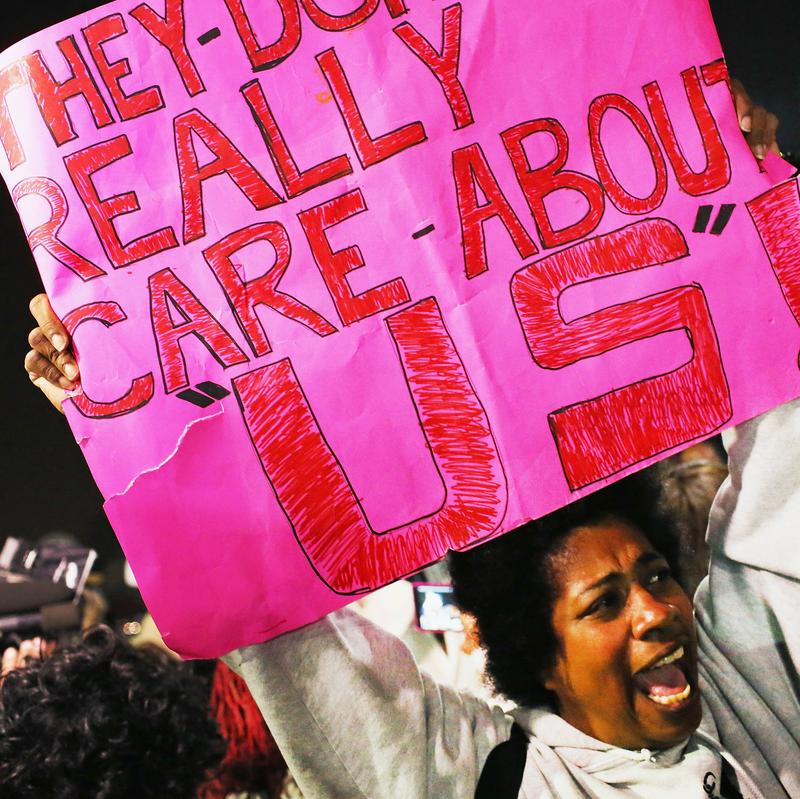BROOKE: From WNYC in New York, this is On the Media. Bob Garfield is away this week; I'm Brooke Gladstone.
[Sounds of gunshots]
BROOKE: Early Thursday morning in Ferguson, an unknown gunman shot two police officers. They were released from the hospital later that morning. Charles Cooke noted in the National Review online that, quote, "They were not shot by Barack Obama. They were not shot by Eric Holder. And they were not shot by “the media” or by the Democratic party." Rather, he wrote, “a man who was in possession of his own agency made a terrible, disastrous decision.” And any who would try to lay blame elsewhere should know better. Fox News, predictably, blamed Holder and Obama and, especially, last week’s Justice Department report that found endemic racism in the Ferguson Police and city administration...
Pundit: “The President, six days ago, called that evidence that the Ferguson police department was oppressive and abusive. And that is the environment in which this happened.”
BROOKE: Since the report’s release, the police chief, the city manager, a judge and two other officers have resigned, but the situation remains tense and unresolved. The shooting occurred at the police station, during one of many protests. The attack on the police was condemned by Holder and the President, and even by the family of Michael Brown, whose shooting death by a policeman last August turned Ferguson into a hashtag, a shorthand for activism, and also, for chaos. Sarah Kendzior recently wrote a piece in Politico called “Ferguson Inc,” about an entity altogether different from the city it’s named for.
SARAH KENDZIOR: Ferguson, Inc. is something that is present in NGOs or in any kind of body that drops the Ferguson name in order to raise money. You also see politicians using it opportunistically in speeches and, especially when the media converges upon the city, trying to cash in and--you know it almost feels like they're staging a "hunger games." You know, you can say Ferguson, Inc.'s big industries are gravy trains and bandwagons. There's a lot of talk about money on the streets of St Louis, and I stress "talk," because there's not necessarily a lot of actual money in play. The average Ferguson protester is often struggling to get by.
BROOKE: You wrote that, "Ferguson, Inc." is a trademark, it's a buzzword, it's something on a T-shirt. And it is basically seen as "the place where it all began."
KENDZIOR: Yeah, and I think that that's a very unfortunate thing. Ferguson, after the grand jury verdict, became a point of departure for a lot of activists and the money left with them. This movement began with a lot of people who were living in poverty taking to the streets and raising issues not just about police violence but about economic deprivation and about loss of opportunity and discrimination. And a lot of those people who were living in poverty on August 9th are still living in poverty; some more so, because they gave up hourly wages and other things to become part of the protest movement.
BROOKE: You quote an activist, Charles Wade, saying that the media looked to Twitter, but this is a story about people who aren't even on Twitter. So what's the story we're missing?
KENDZIOR: The story you're missing is the story of people who can't even afford a phone plan, much less go on and tweet prolifically. And that's a story that gets neglected. You know, people come here when, you know, like last night there's officers that're shot or when there's arson or when there's looting or when there's some sort of drama. But the real crisis is the sort of hardship of day to day living.
BROOKE: I did see one strong note of progress, I thought. The Missouri Supreme Court assigned a state appeals court judge, on Monday, to oversee all of the city's cases. They didn't just fire a judge; they've fired the local courts.
KENDZIOR: Yes, I definitely see that as a sign of progress. But there are 89 other municipalities in St Louis County, so I think focusing on Ferguson as its own entity is the wrong way to look at things. You need to look at the places that, honestly, make Ferguson seem fair and functional by comparison. Ferguson is not the worst place to live in St Louis County. It's not the place where you're most likely to be mistreated. It's just the most famous place.
BROOKE: So do you wish there weren't a "Ferguson, Inc."?
KENDZIOR: I do think it's better to have attention on what's happening in Ferguson than to not have attention at all. I wish that there was more attention to the plight of the everyday person in Ferguson--and that includes the everyday protester in Ferguson.
BROOKE: But, Sarah, as you noted in your own piece, the constant protests...nobody sees them, sometimes they're only a dozen people doing a memorial somewhere...I mean, is that worth the trouble?
KENDZIOR: Well, I think it depends on who your intended audience is. And I think some of the protest action is aimed at people locally. That's where power lies. The DOJ managed somehow to prompt these resignations, but I think until you see a change of who is in charge of various jurisdictions and who are our representatives, then you're not necessarily going to see actual change. I don't think that national media coverage is necessarily a great standard to judge the pragmatics of political movements.
BROOKE: Sarah, thank you very much.
KENDZIOR: Thank you for having me.
BROOKE: Sarah Kendzior covers politics, economy, and the media. She's based in St Louis.
